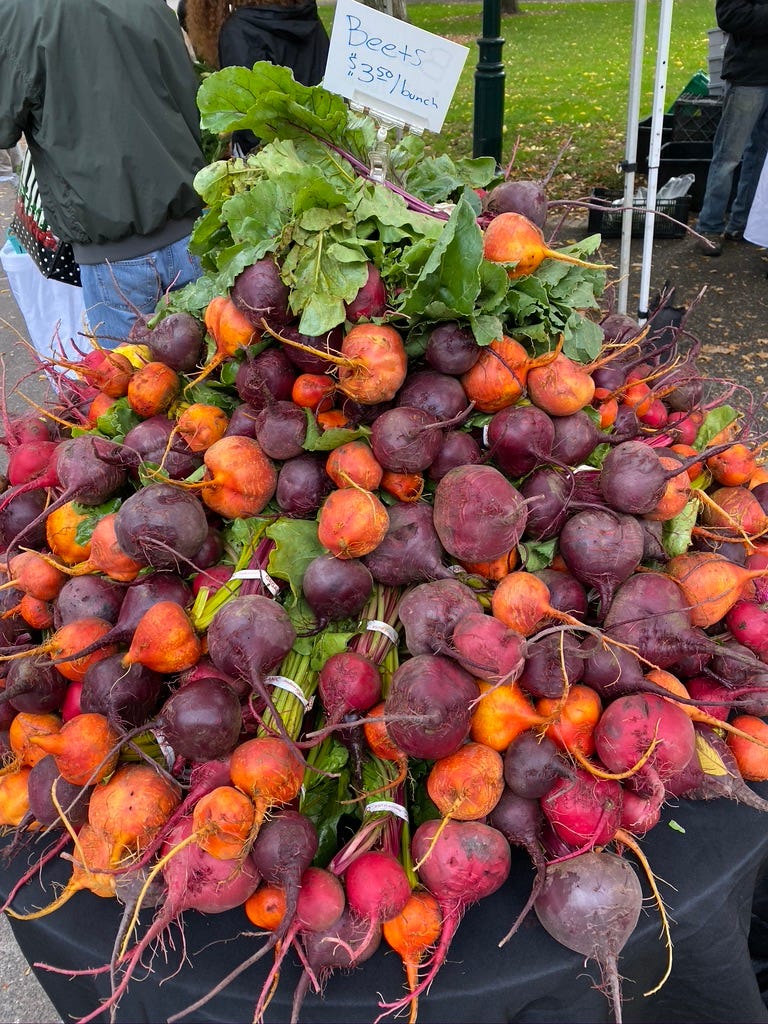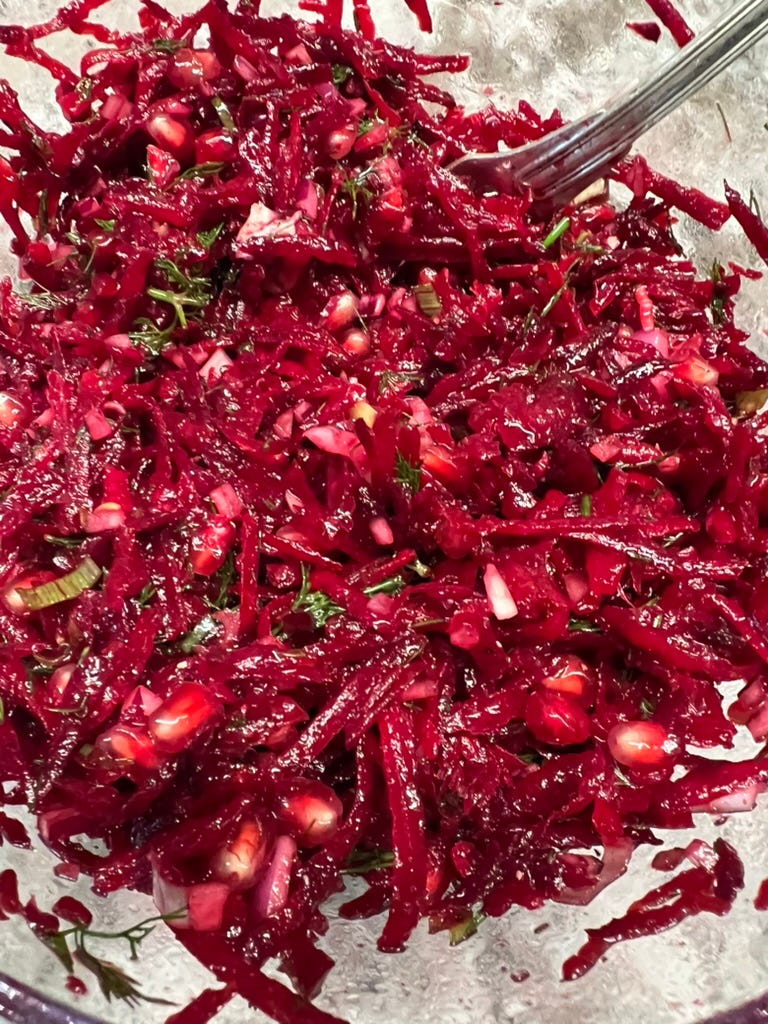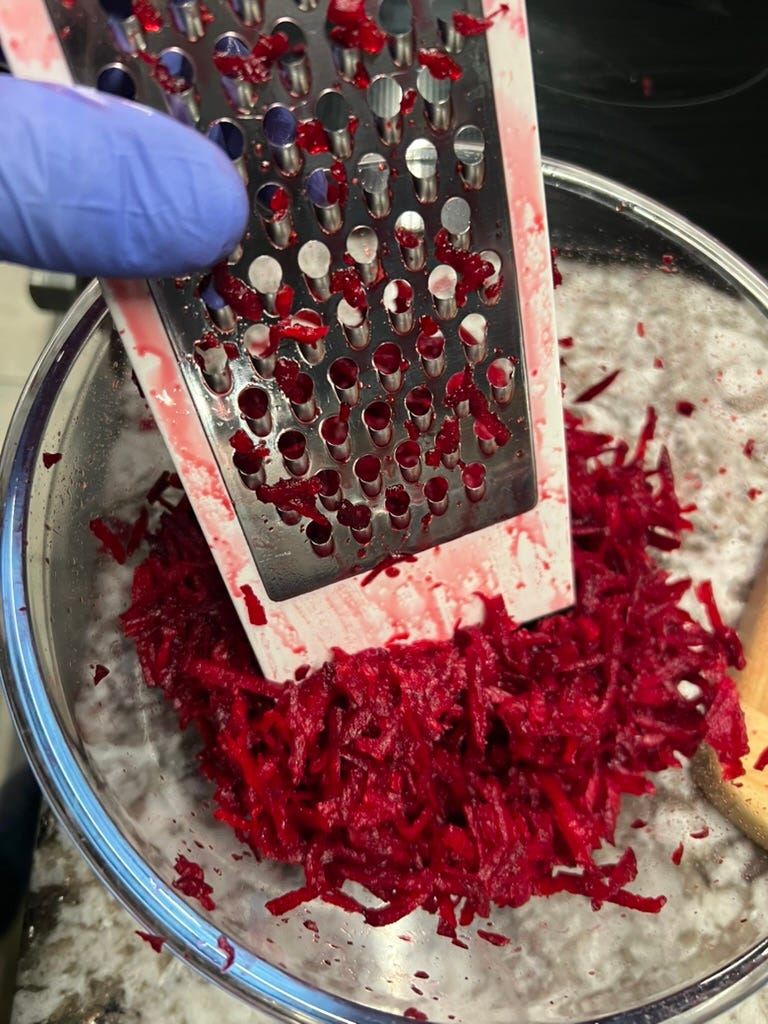Issue #180: Beet & Pomegranate Slaw
Well, that Happened • A Seasonal Salad • Surprise! You Don't Have to Cook Beets
I assumed we wouldn’t know who the next president of the U.S. would be when I hit send on today’s newsletter. I should have known better.
More than the disappointment at how decidedly we elected a convicted felon, rapist, liar, racist, misogynist, national security threat, business failure, and proto-fascist, not to mention his partisan panderers, I’m angry that our seemingly sacred and strong institutions couldn’t do anything to stop him from running in the first place. Of course, those institutions were made by and are made up of we, the people. Their paralysis predates this election. We can’t even blame the Electoral College this time around.
Now, in addition to Trump’s gloating, those of us on the left of Hitler will have to suffer the endless analysis of what failed. On first pass, the Harris/Walz campaign did everything “right,” including spending more money, more strategically than any campaign in history. I personally know some of the people who were involved and I can say they are among the brightest and the best. But in this prosperous land of overrated opportunism, exaggerated entitlement, and craven capitalism, even billions of dollars “well spent” couldn’t counteract generations of rampant selfishness that we rationalize as individualism and a related insidious moral bankruptcy that we rationalize as freedom. Turns out America wasn’t ready to be led by a progressive Black and Southeast Asian woman married to a Jew. This should surprise no one. But still, it disappoints.
For leadership, we’ve chosen bravado, bluster, and bullying, not empathy, hope, and expertise. Such a choice poses deep ontological questions, moral questions, as well as, I hope, a post mortem of our education system, which has misaligned our beliefs and our behaviors and left so many people behind. Today, it feels to me, and I’m no political scientist, that the American experiment has failed.
Which is not to say we stop trying. But it is going to get harder and scarier for many in the meantime. I realize I’ll likely lose readers for expressing these initial, early-morning thoughts and feelings. And that, too, is part of the problem. We need to create space for differences of opinion—not differences of reality, mind you. We have a lot more work to do. I hope you’ll stick around.
These are times to turn off the television, sign out of social media, and get into the kitchen to cook. —Mitchell
Beets are further proof that nature is magic, in my opinion. Their deep color, dense texture, intense sweetness, and earthy flavor are distinctive and unique. It’s hard to understand how such a thing can grow from a little seed. Yes, I know, the same can be said of every fruit or vegetable. And I do say it. Nature is amazing! (Human nature? Meh. Not so much. See above.)
I also know that the same qualities I love about beets make many people hate them. Although this doesn’t describe my experience, I think much of the distaste for beets comes from the flabby, tasteless, canned, crimson disks that were passed off as “good for you” when people were kids. Most commercially made pickled beets are no better. It’s no wonder the ubiquitous roasted beet salad with goat cheese is a revelation to those who’ve never encountered anything like it before. And boy is it delicious.
Most often when a recipe calls for beets, you expect them to be cooked. Usually you roast, boil, steam, or pressure cook them—the last, a favorite. They are often peeled after being cooked, when the peels slip off quite easily. (See Issue #94 for more detail on how I do it and for a great recipe for beet hummus.)
That said, sometimes you have to peel beets while still raw. This can seem a bit challenging. The beguiling ginger beet soup I wrote about in Issue #138, a signature recipe of my friend Anita Jaisinghani and her Pondicheri restaurant in Houston, calls for raw beets, peeled and chunked, which you then cook just until soft, so the soup benefits from their bright color. The first few times I made it, my hands were dyed red for several days. Then I realized I could wear rubber gloves to protect them. A game changer.
But I bet you didn’t know you can eat beets raw. I know Monday night Nate was surprised by that fact when I served him this delicious beet slaw. With a crunchy texture and refreshing juiciness, raw beets almost seem like a different vegetable. This salad combines shredded raw beets with pomegranate, which is also in season at the moment. The soy is there for umami, the maple syrup underscores the beets’ natural sweetness. It’s quick and delicious and it gives me and hopefully you a whole new reason to love beets.
RECIPE: Beet & Pomegranate Salad
Makes enough for 3 or 4 people as a side
3 or 4 medium raw beets (about 1 1/4 pounds), peeled, see below
Arils from 1/2 large pomegranate (about 2/3 cup), see below
1/2 small red onion, minced
2 green onions or handful of chives, chopped
6 tablespoons olive oil
3 tablespoons cider vinegar
Juice of 1/2 lemon
1 teaspoon maple syrup
1 teaspoon soy sauce
Sea salt and freshly ground black pepper
Still wearing rubber gloves if you have them, into a large bowl grate the beets on the large holes of a box grater. Add the pomegranate seeds, onion, green onions or chives, olive oil, cider vinegar, lemon juice, maple syrup, soy sauce, and some salt and freshly ground pepper. Toss well. Taste and adjust the seasoning.
Peeling Raw Beets
If you don’t want to walk around with red hands for a few days, put on a pair of rubber gloves. Using a sharp paring knife or vegetable peeler, peel the beets as you would an apple, slicing off the root and stem and and then peeling around the bulbous center. Watch where the peels land, they can stain light-colored counters, clothing, and other surfaces. Keep the gloves on while you cut, shred, or otherwise prep them for your recipe.
Removing the Arils or Seeds from a Pomegranate
Slice a pomegranate in half crosswise through the center. Place a large bowl in the sink and grab a wooden spoon with your dominant hand. With the cut half of the pomegranate facing down in the palm of your weaker hand, position yourself over the bowl. Whack the skin side of the pomegranate with the wooden spoon hard enough to knock the arils out into your hand. A few will fly between your fingers into the sink. Keep whacking, rotating the pomegranate to hit all sides, until most of the seeds are expelled. Be careful not to hit your fingers. When it feels sort of empty, turn the pomegranate over, and pull it apart into sections to force out any remaining seeds by hand. Remove any of the whitish pulp that may have been knocked out with the seeds.








Thank you, Mitchell. You have not lost me nor the people we both hold dear together. More to come, but I am passing this on to people who matter, who are rational, sane, self-critical, and proud Americans (for the aforementioned reasons, not the enumerated false gods and facile "solutions" that you've ID'd). There is so much more to do, and it begins not with finger-pointing but with lifting up those around us who are more fragile, who have even more at stake, who will be made more vulnerable. We are in pain; we are not defeated.